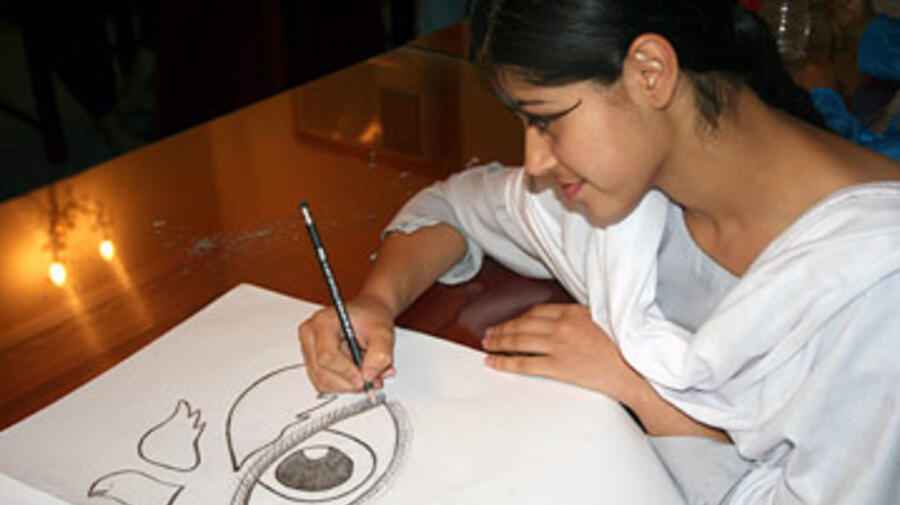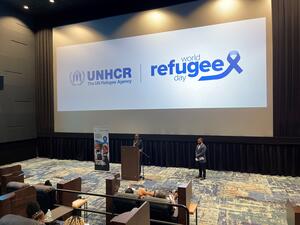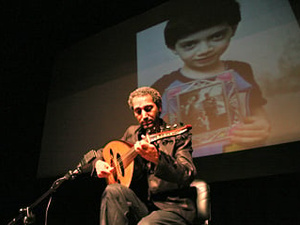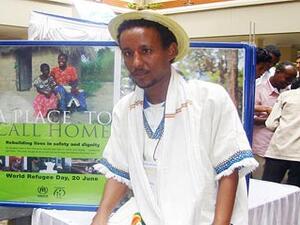Young Afghans draw hope from refugee life
Young Afghans draw hope from refugee life

Afghan refugee Angela Barakzai puts the final touches to her vision for peace in her homeland. She was among some 50 young refugees in Pakistan taking part in a drawing contest to mark World Refugee Day.
ISLAMABAD, Pakistan, June 19 (UNHCR) - Angela Barakzai was thinking of peace in Afghanistan as she put the final touches to her drawing of a woman. "The eyebrows are shaped like a dove," the 18-year-old pointed out. "It shows the hope for peace in my country."
Beside her, fellow refugee Susan Alime was less optimistic. She drew a woman's face - half exposed and half covered by a burqa. Below the face was a candle wrapped in barbed wire. "Women are not yet free in Afghanistan," she said. "We came to Pakistan in 1997 from [eastern Afghanistan's] Ghazni province. There was no school for girls under the Taliban. But my father valued education for us, so he decided to leave."
Hundreds of thousands fled the radical Islamic Taliban regime, which seized power in 1996 and forced women to stay at home unless clad in the head-to-toe burqa. Women could not work and girls were not allowed to go to regular school. The Taliban were overthrown at the end of 2001, but there is still opposition among some Afghans to girls attending school.
The teenagers were among more than 50 Afghan students taking part in a drawing contest to mark World Refugee Day, which falls on Tuesday. Held in Islamabad earlier this month, the contest drew participants from as far as the refugee camps of Mansehra, three hours' drive away. The topic, "My Hope for the Future," was based on this year's World Refugee Day theme of "Hope."
The artists ranged from young girls with henna-stained fingers to older boys with fuzz on their faces. Some drew standing up, others sprawled over the table inches from their masterpieces. Teachers hovered around, coaching or even helping when no one was looking. Images of houses, tents, trees and mountains dominated the canvases, but the creative flair varied across age and experience.
"I want to show that all Afghans have to work together to build a strong country," said Mohammed Khalid, 13, drawing a tree sheltering a family of birds. "I was only a year old when my family came to Pakistan from Kabul. I hope to see Kabul myself one day."
Jamil Shah, a renowned Pakistani artist who headed a panel of five judges for the contest, noted, "All the drawings, very innocently, desire a peaceful and honourable existence in a place called homeland." The top prizes will be presented at an official World Refugee Day ceremony in Islamabad on Tuesday.
One of this year's highlights is a fashion show of costumes from Afghanistan's myriad of ethnic groups. Other linked activities have included a family day last Saturday showcasing refugee cuisine, music, dances, arts and crafts.
As the events approached, the refugee students have been busy rehearsing. Twirling with tradition, their vibrant dances exude pride in their rich culture. Their skits trace the emotional journey from Afghanistan to life in exile. A trio of Iranian siblings plays music that reverberates with a longing for their homeland.
Fifteen-year-old Zamanuddin has chosen to express his hopes in words. "Afghanistan is not just a land, it's also the people. There is a need for spiritual, intellectual, economic and political development," says the young Afghan, rehearsing his speech for June 20. "This is the time when the society of Afghanistan is growing and each of you here today is part of that development. But now the challenge is to develop a system which stems from within our culture and thoughts and not one that is imposed by others."
The eloquent teenager has come a long way from his native Parwan province. In Pakistan, he started working at the age of eight, earning 10 rupees (16 US cents) a day as a dishwasher in a burger restaurant. He taught himself English, learning one new word every day.
Life changed when Zamanuddin received a scholarship from an Islamabad-based non-governmental organisation, HOAP. He now lives in a hostel and is studying for his "O" levels while the rest of his family has returned to Parwan, which is just north-west of Kabul.
"In a way, I'm thankful the war drove us out of Afghanistan. In Pakistan and Iran, we're exposed to the world and are open to new ideas," says Zamanuddin. "I will return to Afghanistan as an economist because I think economic development is the base of all developments. I will also try to develop child psychology and spread new ideas through them."
May the flame of hope burn bright for these young refugees.
By Vivian Tan and Babar Baloch in Islamabad, Pakistan






